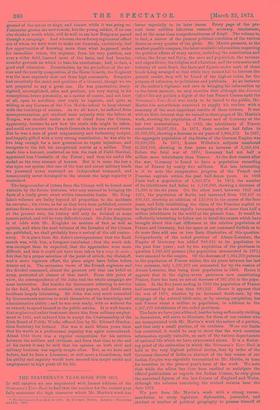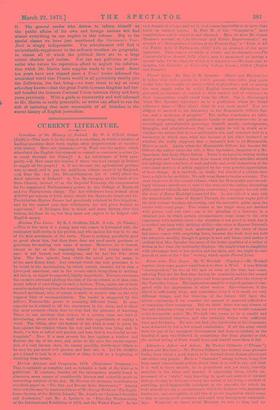THE STATESMAN'S YEAR-BOOK FOR 1873.
IT will surprise no one acquainted with former editions of the Statesman's Year-Book to find that the number for the current year fully maintains the high character which Mr. Martin's work has • The Statesman's rear-Book for 1873. By Frederic Martin. London : Macmillan and Co. 1873. borne especially in its later issues. Every page of the pre- sent issue exhibits laborious research, accuracy, conciseness, and at the same time comprehensiveness of detail. The volume is, in fact, a mirror of the present political condition of the various States in every quarter of the globe. Mr. Martin presents, in the smallest possible compass, the latest available information respecting the political affairs of every nation, including the constitution and rulers, the Army and Navy, the area and population, the revenue and expenditure, the religion and education, and the commerce and industry of each State, the facts and figures under each of these heads being arranged so that while they cannot fail to interest the general reader, they will be found of the highest value, for the purpose of reference, to politicians and publicists. As an instance of the author's vigilance and care in bringing his information up to the latest moment, we may mention that although the Journal Officieldid not publish a digest of the last French Census until the Statesman's Year-I3Jok was ready to be issued to the public, Mr. Martin has nevertheless contrived to supply his readers with a summary of the most important results of those returns. It was with no little interest that we turned to those pages of Mr. Martin's work, showing the population of France and of Germany at the last two enumerations. In 1866, the inhabitants of France numbered 38,067,094. In 1872, their number had fallen to 36,102,821, showing a decrease in six years of 1,964,273. In 1867, the aggregate population of the States of the German Empire was 38,509,735. In 1871, Kaiser Wilhehn's subjects numbered 41,058,139, showing in four years an increase of 2,548,404. Before the fatal war of 1870, Germany had not half a million more inhabitants than France. At the first census after the war, Germany is found to have a population exceeding that of France by nearly five millions. Not less interesting is it to note the comparative progress of the French and Prussian capitals within the past half-dozen years. In 1866 Paris had a population of 1,825,274. In 1872, the number of its inhabitants had fallen to 1,749,380, showing a decrease of 75,894 iu the six years. On the other hand, between 1867 and 1871, the population of Berlin had increased from 702,437 to 826,311, showing an addition of 123,904 in the course of the four years, and fully establishing the claim of the Prussian capital to be regarded as the most rapidly increasing city of more than half a million inhabitants in the world at the present time. It would be sufficiently interesting to follow out in detail the causes which have brought about this vast difference in the relative population of France and Germany, but the space at our command forbids us to do more than add one or two facts illustrative of this question. Independently of the ceded province of Alsace-Lorraine, the Empire of Germany has added 998,915 to its population in the past four years ; and by the acquisition of the provinces in question 1,549,459 persona (the population enumerated in 1871) were annexed to the empire. Of the decrease of 1,961,273 persons in the population of France within the six years between her last two censuses, only 1,597,219 are accounted for by the cession of Alsace-Lorraine, that being their population in 1866. Hence it appears that in the eighty-seven provinces now constituting France, there has been an actual decrease of 367,054 in the popu- lation. In the five years ending in 1866 the population of France had increased by not less than 680,933. Hence it appears that the war of 1870, whether by au increased death-rate, by the stoppage of the natural birth-rate, or by causing emigration, has cost France about a million in population, in addition to the 1,597,219 inhabitants of the ceded provinces.
The facts we have just adduced, besides being sufficiently striking in themselves, will serve to illustrate for those of our readers who are unacquainted with Mr. Martin's work the nature of a portion, and that only a small portion, of its contents. Were our limits less restricted, it would be easy to show that the work contains information equally valuable, on each of the various departments of national life which we have enumerated above. It is a flatter- ing proof of the estimation in which the Statesman's Year-Book is held in the very highest political circles, that by order of the Governor-General of India an abstract of the last census of our Indian Empire was especially transmitted to Mr. Martin, in time for insertion in the present year's issue of the work. We note that while the editor has thus been enabled to anticipate the official publications as regards the Indian Census, he only gives the -unrevised figures of the last Census of England and Wales, although the volumes containing the revised returns bear the date 1872.
We part from Mr. Martin's work with a strong recom- mendation to every legislator, diplomatist, journalist, and student or teacher of political geography to possess himself of
it. The general reader who desires to inform himself on the public affairs of his own and foreign nations will find almost everything he can require in this volume. Bu, t to the special classes we have just mentioned the Statesman's Year- Book is simply indispensable. The schoolmaster will find it an invaluable supplement to the ordinary treatises on geography, in almost all of which the political facts are to a large extent obsolete and useless. Nor can any politician or jour- nalist who values his reputation afford to neglect the informa- tion which Mr. Martin here supplies ready to his hand. Some ten years have now elapsed since a Times' leader informed the astonished world that Prussia would in all probability shortly join the Zollverein, the fact being—we were about to say as every schoolboy knows—that the great North-German kingdom had her- self founded the German Customs' Union between thirty and forty years previously. With a guide so trustworthy and well informed as Mr. Martin so easily procurable, no writer can afford to run the risk of imitating that most memorable of all blunders in the recent history of English journalism.



































 Previous page
Previous page